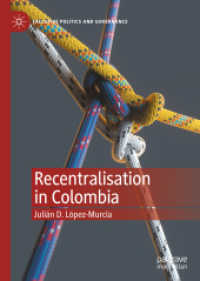- ホーム
- > 洋書
- > 英文書
- > Psychology
Full Description
Relationships in Development is both a clinical resource and a vital intellectual history-- a clear account of how research about infancy transforms psychotherapy practice and an authoritative survey of the place of child development in psychoanalysis.
It updates developmental psychoanalysis by integrating it with trauma theory, neuroscience, nonlinear dynamic systems theories, and infant mental health work. "Executive summaries" of attachment, intersubjectivity and "the relational baby" are offered, leading to an open and flexible approach to psychodynamic therapy in varied socioeconomic and cultural situations. This Classic Edition includes a new introduction assessing the current state of developmental thinking in the psychotherapy world.
Relationships in Development will appeal to psychoanalysts, psychoanalytic psychotherapists, and graduate students in psychology, social work, and psychotherapy, as well as to all those interested in psychotherapy and child development.
Contents
New Introduction. Introduction: Why Developmental Psychoanalysis? Part I:How We Got Here: A Roadmap to Psychoanalytic Theories of Childhood and Development 1. Childhood Has Meaning of Its Own: Freud and the Invention of Psychoanalysis 2. Theory I: Foreshadowings: Core Themes and Controversies in the Early Freudian Theories 3. The Baby at the Crossroads: The Structural Model, Ego Psychology, and Object Relations Theories 4. Theory II: What Is a "Robust Developmental Perspective?" 5. The Postwar Diversification and Pluralization of Psychoanalysis in the United States: Interdisciplinary Expansion, the Widening Clinical Scope and the New Developmentalism Part II: The Relational Baby: Intersubjectivity and Infant Development 6. Infancy Research: Toward a Relational-Developmental Psychoanalysis 7. Clinical Implications of Infancy Research: Affect, Interaction and Non-Verbal Meaning in the Dyadic Field 8. Theory III: The Relational Baby: Psychoanalytic Theory and Technique Continuities from Infancy to Adulthood: The Baby is Out of the Bathwater 10. Theory IV: The Move to the Maternal: Gender, Sexualities, and the Oedipus Complex in Light of Intersubjective Developmental Research Part III: Attachment and Recognition in Clinical Process: Reflection, Regulation and Emotional Security 11. Intersubjectivity Today: The Orientation and Concept 12. Attachment Theory and Research in Context: Clinical Implications 13. Recognition and Mentalization in Infancy and Psychotherapy: Convergences of Attachment Theory and Psychoanalysis 14. Infant-parent interactions, phantasies, and an "internal two-person psychology": Kleinian and intersubjective views of projective identification and the intergenerational transmission of trauma Part IV: Vitality, Activity, and Communication in Development and Psychotherapy 15. Coming to Life in Time: Temporality, Early Deprivation, and the Sense of a Lively Future 16. Forms of Vitality and Other Integrations: Daniel Stern's Contribution to the Psychoanalytic Core Part V: Awareness, Confusion and Uncertainty: Nonlinear Dynamics in Everyday Practice 17. Feeling Puzzled While Paying Attention: The Analytic Mindset as an Agent of Therapeutic Change 18. Dynamic Systems Theories as a Basic Framework for Psychoanalysis: Change Processes in Development and Therapeutic Action 19. Searching for Core Principles: Louis Sander's Synthesis of Biological, Psychological, and Relational Factors and Contemporary Developmental Psychodynamics







